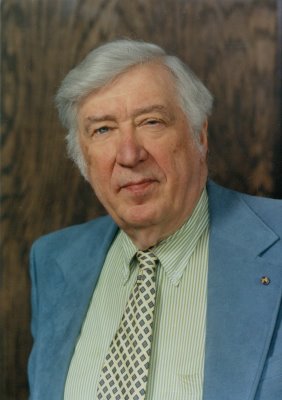BMOP offers aptly mixed tribute to Schuller’s musical legacy
There’s no doubt that Gunther Schuller left an indelible legacy on American music, and with his death this past summer, he left a void in Boston’s musical landscape.
Concerts paying tribute to the composer have been a feature in the local concert season. Sunday afternoon at Jordan Hall, on what would have been Schuller’s 90th birthday, Gil Rose, Odyssey Opera, and the Boston Modern Orchestra Project offered a memorial concert with performances of three of the composer’s works.
The centerpiece was a real curio, Schuller’s one-act opera The Fisherman and His Wife, presented in a semi-staged production.
Based on the Grimm’s fairytale, John Updike’s libretto for the opera tells of an unhappy fisherman’s wife, who asks for increasing wealth and power from a magical fish that her husband has caught. When she asks to be like God, the fish reverts the couple back to their original poor state, with the wife all the happier in her condition.
Schuller’s opera dates from 1970 and has only had a single run of performances, given by the Opera Company of Boston under the composer’s direction. And though the work possesses some fine music, its tedious story shows why it hasn’t become popular.
Schuller’s score is powerful, with shimmering textures and brooding, Britten-like chromaticism that points to psychological depths that just aren’t present in the drama.
Updike’s story is overly repetitive and lacks dramatic impact. The main characters are wooden and not even likable in the redemptive conclusion. The biggest mystery is the fisherman, who continuously reminds the audience that asking the fish for more wishes is “not the right thing to do,” though he does it anyway.
Yet Rose and company clearly believe in this piece and put a lot of work and research into reconstructing the score from the parts to make it suitable for this production.
Sunday’s performance was mostly excellent. Sondra Kelly has had a remarkable career at the Metropolitan Opera, where she has sung in roles ranging from Mozart to Wagner. As the wife, the mezzo-soprano sang with a round, rosy tone that made the most of the one-dimensional character, capturing, to good effect, the wife’s greedy temperament.
Tenor Steven Goldstein is a versatile singer-actor, but his portrayal of the fisherman felt a little flat, owing more to the writing than his skill. His soft voice aptly fit the timid character, yet it did not always speak in the upper register. In the work’s climactic points, the dark waves of Schuller’s orchestration drowned him out.
David Kravitz brought a full-sounding baritone to the role of the fish, even in light of the fact that he was under the weather. Soprano Katrina Galka was charming and hilarious as the cat, and she sang with brilliant precision in the clarion high notes of Schuller’s angular vocal writing.
Rose led a lithe and sensitive accompaniment that at least brought new life to Schuller’s music.
Costumes and sets were simple and effective, with pictures of shack, cottage, castle, and ocean projected onto a screen to set the scenes. It wasn’t enough, unfortunately, to save the bland story.
Filling out the first half of the program was Schuller’s Journey into Jazz.
Made popular on Leonard Bernstein’s New York Philharmonic broadcasts and recorded by BMOP for their own label, the work is a prime example of Schuller’s Third Stream style, which mixes elements of classical and jazz music into a single genre.
Its Peter-and-the-Wolf-like parable tells of a young trumpet player, Eddie Jackson, who discovers jazz and longs to be able to play with the freedom and individuality that the music inhabits.
Schuller’s score is a true delight with colorful music that evocatively conveys the story. The narrator in this case was Schuller himself, BMOP having used his voice-over recording from their commercial release of the work.
Rose led a taut and energetic performance, and the orchestra played with warmth to reflect Schuller’s narration.
The jazz sections were superb and resembled the cool, swinging style of Miles Davis’ Birth of the Cool (on which Schuller himself played French horn). Two of Schuller’s sons, Ed (bass) and George (drums), supplied a sturdy groove.
Trumpeter Richard Kelley donned many hats in this piece, effectively capturing the naïveté of young Eddie as he learns his craft, wrong notes and all. Kelley’s tone is full and round, yet he was able to find a dusky quality in the piece’s swing sections.
The saxophones, Nicole Kämpgen (alto) and Don Braden (tenor), were equally fine as they traded bluesy solos with each other.
Less jazzy but equally exciting is Schuller’s sinfonietta, Games, which opened the concert.
This sparkling piece was composed for and premiered by the Boston Symphony Chamber Players in February 2014. Mercurial and delightful, Games is a Rochbergian collage of musical quotations, with hints of Till Eulenspiegel and Mozart’s Musical Joke thrown into the mix.
Scored for ten strings and winds, the piece offers a colorful palette of sounds, from growls and snarls to beaming glissandos.
Rose led a clean if somewhat tentative performance of the work that didn’t quite plumb the nervous energy of Schuller’s writing. But it was good to hear this work again so soon after its completion, especially as part of warm memorial concert such as this one.
The next concert of the Boston Modern Orchestra Project will feature music by Kernis, Wagner, Maxwell Davies, Theofanidis, Hartke, and Moravec, all inspired by Bach’s Brandenburg Concertos 8 p.m. January 22 at Jordan Hall. bmop.org
Posted in Performances
